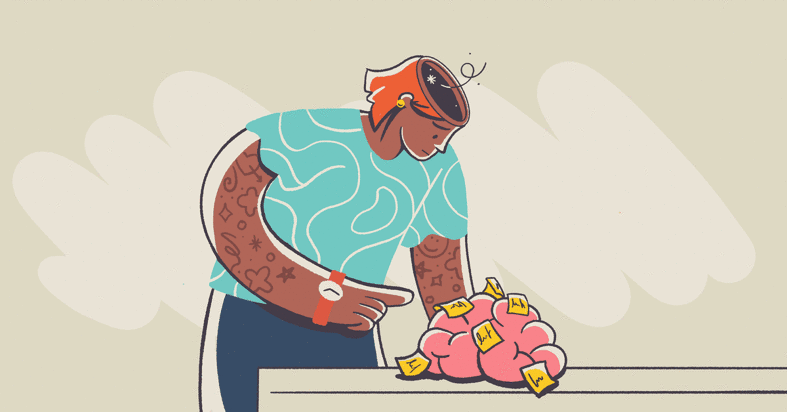PPMS: Cognitive Decline Does NOT Have Me!!!
It’s one thing to have cognitive issues like memory problems, word finding difficulty, and such.
It’s something entirely different when you have actual diagnoses of Cognitive Decline, and Reduced Processing Speed, from 2 different neuropsychologists.
It’s profoundly humbling.
It’s somewhat devastating. Especially when you have to walk away from the job you built your life around, and that you intended to be at till you retire.
When I started to take notice
Let’s go back in time a little, shall we. For 3 decades, I dealt with MS symptoms, and I had an inkling of an idea that I had an autoimmune illness, as far back as my 20s in medical school. But we didn’t know what it was.
It started with pain and swelling in my wrists, that fit the presentation of Carpal Tunnel Syndrome. Except the part where I had no history of overuse, or repetitive motions, that would account for it.
Nonetheless, we treated it as such. I even had surgery when I had a crisis in which there was swelling in my left hand that would not resolve with conservative therapy. It progressed to me starting to lose function in my left hand, as the nerves in my wrist were so compressed by surrounding structures.
I had an urgent surgery to release the carpal tunnel. Did it help my symptoms? It helped the acute symptoms. But my chronic course after healing went back to baseline, and had not resolved.
My symptoms led me to choose non-surgical speciality in medicine
I have dealt with symptoms from my teen years, and it even played a role in my deciding to go with a non-surgical specialty in medicine. I had several rheumatologic work ups over those years, but we found nothing.
Fast-forward a few decades. In 2014, at 40, I herniated a disc in my low back which within 2 weeks progressed to left leg pain, and weakness. I was dragging my left leg when I walked, and my left hip went with it. My walking style became “hip drop, drag leg, hip drop, drag leg!” Try painting that mental picture.
After months in and out of therapy, I had 2 back surgeries, wound up physically disabled, and using a scooter almost every time I left the house.
Realizing I had MS
By 2016, I had come to the realization that I had MS. But it took a while to find a doctor who believed me. My first neurologist would not do any work ups after my brain and cervical MRIs didn’t show clear lesions.
I found help at the MS Center of Atlanta. My doctor believed me. My story was MS, My exam and symptoms were MS. Difficulty walking, fatigue, chronic pain, memory issues, nerve pain, bladder spasms, vision issues, balance issues, to name a few.
Being diagnosed with PPMS
Spinal tap, MRIs however were not clearly MS. He sent me to so many specialists to rule out everything else it could be. Then be called it—Primary Progressive MS.
What seeing the right neurologist and getting the diagnosis in 2016 did for me was, I was able to start treatment. When doctors treat the textbook and not the patient, and go by the faulty McDonald’s criteria 100% to the letter, many patients either get a delayed diagnosis, or they never get a diagnosis, despite symptoms progressing. It was another two years before my MRI started to look clearly like MS lesions. I shudder to think of how ill I would have been if I didn’t get that diagnosis when I did.
Now, it’s been 7 years since I became disabled. I’d started on the holistic journey since my back and leg issues showed up, even before my PPMS diagnosis 5 years ago. And at diagnosis, there was no medication for me, so it wasn’t until when Ocrevus hit the market in 2017 that I got on it after a few months.
But my insightful doctor who made the diagnosis rather than waiting for the MRI to catch up, made it possible. And I was able to refer him many patients like me, who desperately needed that MS diagnosis. He came through every single time. I digress.
How I live my life now
Now, I do the Wahls Protocol (Wahls Paleo Plus), and that 3rd level finally hacked how I felt more than anything else. I realized you can’t out supplement MS. For me, even with nutrition, the 1st 2 levels of the protocol just touched the surface. But advancing to the keto version with intermittent fasting felt like I found something I lost.
I was in PT for 2 years initially. I have worked part-time since after my back surgery, as my function never got back to my baseline. It’s been quite a journey physically, but I have kept at it. HIIT and yoga, and daily exercise are my saving grace.
Now, back to cognition. Hacking my body has been an ongoing process. Hacking my brain so far has not gotten the same result.
In fact, I recently stopped practicing medicine…
It started with simple things like forgetting words, but it became forgetting directions to places I’d been to several times, forgetting to pay bills, having trouble managing money, and managing my medications and supplements.
Even though my ADLs (Activities of Daily Living) were profoundly affected in the beginning of my disability, those did see some improvement over the years. ADLs are feeding, dressing, bathing, toileting and walking. My husband made all my meals for many, many, years. I used to sit on the floor to get anything on my lower body like socks, while getting dressed. I still need help with zippers and buttons. I walk with a cane or walker, just really depending on distance I plan on walking. I still have my scooter for back-up, but have needed it much less than 7 years ago. I used to have to sit on the slab in the shower and take a break between showering and getting dressed.
Per an NCBI article “Instrumental Activity of Daily Living” from November 2020 by Hui Jun Guo and Amit Sapra, “Instrumental activities of daily living (IADL) are those activities that allow an individual to live independently in a community. Although not necessary for functional living, the ability to perform IADLs can significantly improve the quality of life. The major domains of IADLs include cooking, cleaning, transportation, laundry, and managing finances.”
I cannot clean, or manage my finances well. Laundry is challenging. I only make quick meals or a salad. Nothing that takes more than 10-15 minutes to put together.
Hearing I had reduced processing speed
I dragged my feet on getting the neuropsychological evaluation. I initially did one with a developmental neuropsychologist, because I wanted to be screened for autism (I’m an autism mom). That’s where I was told that I had reduced processing speed. It was an accurate description of the cobweb feeling in my head, while trying to think.
The first neuropsychologist also recommended a proper neuropsychological evaluation targeting MS. I dragged my feet some more, and eventually, got it done about a year ago, because I knew I’d have to stop working. Soon. Verdict—Cognitive Decline.
My work had started to be impacted
I had gotten slower and slower at work, to where I was seeing 3-5 patients on my half days, 4 days a week. To give proper context, I should be seeing 9 or 10 in that half day timeframe, or at least 7 or 8. Each visit took such a long time. And it still sucked the life out of me. I was physically and mentally exhausted. Daily. More importantly, I couldn’t keep up with the administrative part of things.
Then after I quit, I realized something else. Being chronically ill, had affected my confidence. I did not see that coming at all, and I’ve been working through that.
The 3 things I’m able to do for my brain health now more than ever, are get more sleep, exercise just a little more daily, and pray more. I need to get back to doing Lumosity daily (app for brain exercises).
I do two zoom workout classes a week (mostly HIIT, which I modify), and 1 yoga class a week.
I use GPS every time I’m driving. I try not to drive at night.
It feels like MS self care takes at least half of my day, or more now. But then again, that’s the meaning of disability. If I can focus and do nothing else, it’s at least 3 hours, which is in line with Dr. Terry Wahls’ estimate of how much time MS self-care takes daily.
Disability is not the end
Rather than focus on the difficulty in managing PPMS, I choose to focus on being thankful that I GET TO do these things, because everyone doesn’t get to.
I have not given up on getting better. I do have an elevated mercury level, which is a neurotoxin. Working on detoxing at the cellular level to address all that.
Who knows? I might just be able to get my cognition back!!!
I do have cognitive decline, but cognitive decline does NOT have me!

Join the conversation